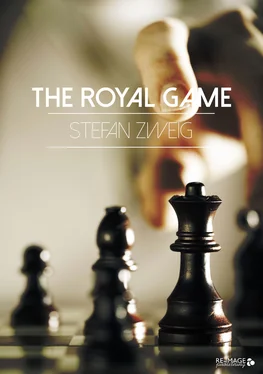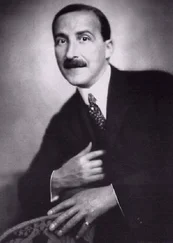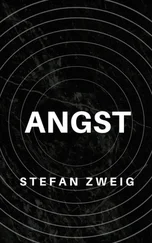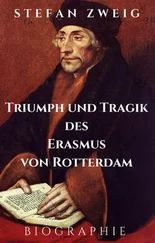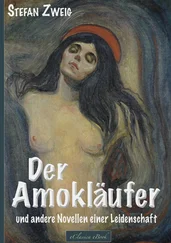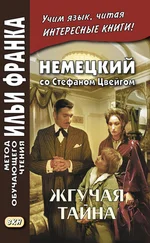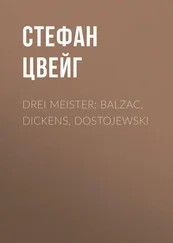Stefan Zweig - The Royal Game
Здесь есть возможность читать онлайн «Stefan Zweig - The Royal Game» — ознакомительный отрывок электронной книги совершенно бесплатно, а после прочтения отрывка купить полную версию. В некоторых случаях можно слушать аудио, скачать через торрент в формате fb2 и присутствует краткое содержание. ISBN: , Жанр: Языкознание, Критика, на немецком языке. Описание произведения, (предисловие) а так же отзывы посетителей доступны на портале библиотеки ЛибКат.
- Название:The Royal Game
- Автор:
- Жанр:
- Год:неизвестен
- ISBN:9783962172770
- Рейтинг книги:5 / 5. Голосов: 1
-
Избранное:Добавить в избранное
- Отзывы:
-
Ваша оценка:
- 100
- 1
- 2
- 3
- 4
- 5
The Royal Game: краткое содержание, описание и аннотация
Предлагаем к чтению аннотацию, описание, краткое содержание или предисловие (зависит от того, что написал сам автор книги «The Royal Game»). Если вы не нашли необходимую информацию о книге — напишите в комментариях, мы постараемся отыскать её.
The Royal Game — читать онлайн ознакомительный отрывок
Ниже представлен текст книги, разбитый по страницам. Система сохранения места последней прочитанной страницы, позволяет с удобством читать онлайн бесплатно книгу «The Royal Game», без необходимости каждый раз заново искать на чём Вы остановились. Поставьте закладку, и сможете в любой момент перейти на страницу, на которой закончили чтение.
Интервал:
Закладка:
Stefan Zweig
The royal game
INTRODUCTION
STEFAN Zweig was one of Hitler’s posthumous victims. Born in Vienna in November 1881, the son of a rich Jewish textile manufacturer, he began his writer’s life as a poet. His first book was a collection of lyrical verse, Silberne Saiten ( Silver Strings , 1901), which taught him that his proper activity lay in the domain of prose. Zweig wrote constantly and easily, in a variety of genres. He translated French literature. In 1935, he wrote the libretto for an opera, Die Schweig-same Frau ( The Silent Woman ), by Richard Strauss (who after the death of Hugo von Hofmannsthal was in desperate search for a new librettist and had no compunction about working with the Jew Zweig). He published biographical profiles both short and long. He wrote novellas and novels. In 1919, after the First World War, he settled in picturesque Salzburg, Mozart’s unloved hometown, writing. In 1935, anticipating the Nazis’ takeover of Austria by three years, he emigrated to England, only to move, in 1940, to Brazil. It was there, in February 1942, that he committed suicide, as did his wife. Zweig left behind, among other works, an unfinished essay on Balzac, an autobiography, Die Welt von Gestern ( The World of Yesterday ), and a novella, Schachnovelle , here translated as Chess Story , both to be published soon after his death. “He died,” wrote the novelist and editor Hermann Kesten, one of the “good” Germans, “like a philosopher.”
Alive or dead, Stefan Zweig was, and to a significant degree still is, an unfailingly popular writer mainly, but by no means only, in the German-speaking world. The text I have been working with, a Fisher paperback dated December 2004, is in its fifty-second printing, an astonishing record that attests to his lasting appeal. His novellas and biographical essays, the two solid foundations of his enduring reputation, are seductive in their celebrated style, invariably casual and informal in tone, shrewd in their choice of themes, and, in the best sense of the term, conventional.
Zweig’s last writings were consistent with the work he had been doing for decades. The essay on Balzac is characteristic of him, the last in a substantial series of biographical sketches and historical portraits, in which he tried to nail down the essence of a figure that interested him: Casanova, Tolstoy, Dostoyevsky, Hölderlin, Erasmus, and Mary Queen of Scots. They are psychological forays in which Zweig attempted to dig beneath the surface, beyond superficial appearance to inner reality, to intellectual and emotional responses of personages whose political and cultural qualities seemed worth exploring. Their lives led Zweig to place them into, or against, their culture. His Dickens is at home among unfailingly complacent and prudish Victorians, and his Nietzsche is an isolated truth-teller not at home anywhere. We can still read these agreeable essays with pleasure and profit, though Zweig’s strongly felt need to find a dominant trait—reminiscent of his great favorite, Balzac—often makes them more ingenious than precise.
That this self-confident proceeding was risky emerges plainly from his autobiography, The World of Yesterday. It is chatty and hyperbolic, brilliantly capturing prominent elements in his pre–World War bourgeois culture but setting aside cogent evidence that might contradict, or at least complicate, his generalizations. Thus—to give a telling example— Zweig’s account of young women in respectable Viennese society before 1914 amounts to a single-minded assault on middle-class family life that is quite one-sided. He writes about overprotected maidens who were kept “in a completely sterilized atmosphere,” innocents who became “educated and over-educated,” for the most part “foolish and untaught, well-bred and unsuspecting, inquisitive and shy, uncertain and impractical, and predetermined by this unworldly education to be shaped and led in marriage by their husbands without a will of their own.” To Zweig’s vision, both penetrating but also rather myopic, sex was taboo for unmarried females not only as an activity before marriage but also as a subject of conversation.
This deplorable state of affairs, to which Zweig chose to devote ample space, could doubtless have been observed among some, perhaps even many, of the young ladies of his acquaintance, but there were other Viennese bourgeoises in his time who worked sturdily toward revising, even eliminating, these attitudes, whether as feminists, university students, or intrepid philanthropists. Of course, when Zweig came to write his autobiography, his liberal culture which he remembered fondly but not uncritically, had been destroyed, and, in retrospect, Zweig saw his past—so distant now!—with a storyteller’s clarity that was overstated for the sake of a literary point. Real life was usually more nuanced than Zweig was ready to acknowledge.
But in his Chess Story —an effective, terse fiction that is among his most successful—Zweig a little indirectly confronted the horrors of his own time, about which he had long remained silent. Chess, a game however noble—it is not called the “royal game” for nothing—becomes in his hands a double duel: a life-and-death struggle between Mirko Czentovic, the world champion, and an aggressive challenger, an amateur, the moody Scottish engineer, McConnor; more importantly, though, the duel is between Czentovic and a certain Dr. B., an Austrian lawyer of Royalist sympathies, taken prisoner by the Gestapo in March 1938, as the Nazis invaded Austria, and for long months held in solitary confinement while being subjected to relentless interrogation. We learn from the story that by a lucky accident, a chess manual fell into Dr. B’s hands, for a while alleviating the burden of his isolation, and that by playing and replaying chess in his head he mastered the game, only to be driven out of his mind by the strange exercise of functioning as his own opponent. Now released from captivity and allowed to go into exile, Dr. B. retains his striking and strangely acquired competence as a chess player, which turns out to have a crucial bearing on the struggle between Czentovic and McConnor. As usual in Zweig’s fiction, separate strands of a complex plot overlap and blend into one.
Indeed, Chess Story beautifully exhibits the private strategy that lies at the heart of Zweig’s literary labors, especially in his novellas and his biographical sketches. He might oversimplify his tale to accommodate a sweeping aphorism or a dramatic conclusion, but he always saw himself as a detective whose principal task it was, whether he was writing fiction or nonfiction, to unriddle the mystery that shaped the life of a Dostoyevsky or a Hölderlin, a Czentovic or a Dr. B. And to clothe his discoveries in eminently readable prose.
It should surprise nobody that Zweig was an occasional correspondent of Freud’s, dedicated a collection of biographical essays to him, and thought of himself as Freud’s ally in the great venture of understanding human nature. In 1929, Zweig a little effusively told Freud how highly he thought of psychoanalysis:
I believe that the revolution you have called forth in the psychological and philosophical and the whole moral structure of our world greatly outweighs the merely therapeutic part of your discoveries. For today all the people who know nothing about you, every human being of 1930, even the one who had never heard the name of psychoanalyst, is already indirectly dyed through and through by your transformation of souls
Читать дальшеИнтервал:
Закладка:
Похожие книги на «The Royal Game»
Представляем Вашему вниманию похожие книги на «The Royal Game» списком для выбора. Мы отобрали схожую по названию и смыслу литературу в надежде предоставить читателям больше вариантов отыскать новые, интересные, ещё непрочитанные произведения.
Обсуждение, отзывы о книге «The Royal Game» и просто собственные мнения читателей. Оставьте ваши комментарии, напишите, что Вы думаете о произведении, его смысле или главных героях. Укажите что конкретно понравилось, а что нет, и почему Вы так считаете.
